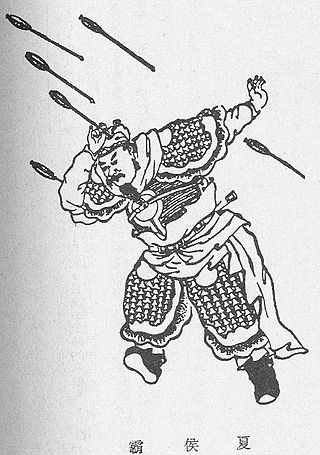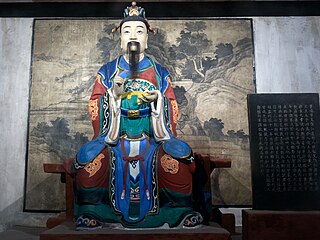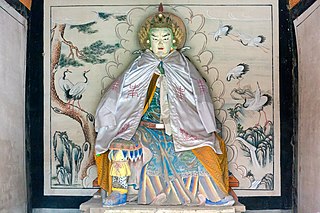Related Research Articles

Lü Bu, courtesy name Fengxian, was a Chinese military general, politician, and warlord who lived during the late Eastern Han dynasty of Imperial China. Originally a subordinate of a minor warlord Ding Yuan, he betrayed and murdered Ding Yuan and defected to Dong Zhuo, the warlord who controlled the Han central government in the early 190s. In 192, he turned against Dong Zhuo and killed him after being instigated by Wang Yun and Shisun Rui, but was later defeated and driven away by Dong Zhuo's followers.

Xiahou Yuan, courtesy name Miaocai, was a Chinese military general and politician serving under the warlord Cao Cao in the late Eastern Han dynasty of China. He is known for his exploits in western China in the 210s, during which he defeated Cao Cao's rivals Ma Chao and Han Sui in Liang Province and the surrounding areas, and forced several Di and Qiang tribal peoples into submission. He was killed in action at the Battle of Mount Dingjun while defending Hanzhong Commandery from attacks by a rival warlord Liu Bei. Xiahou Yuan's death was highly dramatised in the 14th-century historical novel Romance of the Three Kingdoms, in which he was slain by Liu Bei's general Huang Zhong during a surprise raid.

Xiahou Ba, courtesy name Zhongquan, was a Chinese military general of the state of Cao Wei in the Three Kingdoms period of China. He was the second son of Xiahou Yuan, a prominent general who served under Cao Cao, the warlord who laid the foundation for the state of Cao Wei. Around 249, Xiahou Ba defected to Wei's rival state, Shu Han, after the regent Sima Yi seized power in a coup d'état. He died sometime between 255 and 259.

Guo Jia, courtesy name Fengxiao, was an adviser to the warlord Cao Cao during the late Eastern Han dynasty of China. Throughout his 11 years of service, Guo Jia aided Cao Cao greatly with his brilliance and foresight, and his strategies were instrumental to Cao Cao's triumphs over rival warlords such as Lü Bu and Yuan Shao. For example, four years before Cao Cao's decisive victory over Yuan Shao at the Battle of Guandu, Guo Jia already foresaw that Cao Cao would win when he pointed out ten advantages Cao Cao had over Yuan Shao.
Cao Ang, courtesy name Zixiu, was the eldest son of Cao Cao, a warlord who rose to power towards the end of the Han dynasty and laid the foundation of the state of Cao Wei in the Three Kingdoms period of China. He was killed at the Battle of Wancheng in 197.

Cao Zhen, courtesy name Zidan, was a military general of the state of Cao Wei during the Three Kingdoms period of China. He was an adopted son of Cao Cao, a warlord who rose to power in the late Eastern Han dynasty and laid the foundation for Wei. After Cao Cao's death and the end of the Eastern Han dynasty, Cao Zhen served under Cao Pi and Cao Rui, the first two emperors of Wei. He is best known for leading a successful defence of Wei from the first two of a series of invasions by Wei's rival state, Shu Han, between 228 and 229.

Jia Xu, courtesy name Wenhe, was an official of the state of Cao Wei during the early Three Kingdoms period of China. He started his career in the late Eastern Han dynasty as a minor official. In 189, when the warlord Dong Zhuo took control of the Han central government, he assigned Jia Xu to the unit led by Niu Fu, his son-in-law. In May 192, after Dong Zhuo was assassinated by Lü Bu, Jia Xu advised Li Jue, Guo Si and Dong Zhuo's loyalists to fight back and seize control of the imperial capital, Chang'an, from a new central government headed by Lü Bu and Wang Yun. After Li Jue and the others defeated Lü Bu and occupied Chang'an, Jia Xu served under the central government led by them. During this time, he ensured the safety of the figurehead Han emperor, Emperor Xian, who was being held hostage by Li Jue. He also attempted to prevent internal conflict between Li Jue and Guo Si, but with limited success. After Emperor Xian escaped from Chang'an, Jia Xu left Li Jue and briefly joined the general Duan Wei before becoming a strategist of the warlord Zhang Xiu. While serving under Zhang Xiu, he advised his lord on how to counter invasions by the warlord Cao Cao, who had received Emperor Xian in 196 and taken control of the central government. In 200, during the Battle of Guandu between Cao Cao and his rival Yuan Shao, Jia Xu urged Zhang Xiu to reject Yuan Shao's offer to form an alliance and instead surrender to Cao Cao. Zhang Xiu heeded his advice. Jia Xu then became one of Cao Cao's strategists.

Zhuge Dan, courtesy name Gongxiu, was a Chinese military general and politician of the state of Cao Wei during the Three Kingdoms period of China. When he held key military appointments throughout his middle to late career, he was involved in all of the three rebellions which broke out in Shouchun between 251 and 258. During the second rebellion, he actively assisted the Wei regent Sima Shi in suppressing the revolt. After the rebellion, the Wei government put him in charge of Shouchun. As the Sima clan became more powerful and established themselves as the de facto rulers of Wei, Zhuge Dan feared that he would end up slain like Wang Ling and Guanqiu Jian – the leaders of the first two rebellions – so he started the third rebellion against Sima Zhao, who succeeded Sima Shi as regent of Wei in March 255. Although he received some support from Wei's rival state Eastern Wu, his rebellion was eventually suppressed by Wei imperial forces and he met his end at the hands of Hu Fen, a military officer under Sima Zhao.

Cao Hong, courtesy name Zilian, was a Chinese military general of the state of Cao Wei during the Three Kingdoms period of China. He started his career in the late Eastern Han dynasty under the warlord Cao Cao, who was his older second cousin.

Fei Yi, courtesy name Wenwei, was a Chinese diplomat, military general, politician, and regent of the state of Shu during the Three Kingdoms period of China. Born in the late Eastern Han dynasty, Fei Yi started his career as an attendant to Liu Shan, the eldest son and heir apparent of Liu Bei, a warlord who became the founding emperor of Shu. After Liu Shan became emperor in 223, Fei Yi gradually rose to prominence under the regency of Zhuge Liang, the Imperial Chancellor of Shu. During this time, he concurrently served as a military adviser under Zhuge Liang and as Shu's ambassador to its ally state Wu. He also played a significant role in the conflict between the Shu general Wei Yan and Zhuge Liang's chief clerk Yang Yi. After Zhuge Liang's death in 234, Fei Yi served as a deputy to the new regent Jiang Wan and progressively assumed greater responsibilities as Jiang Wan gradually relinquished his powers due to poor health. In 244, Fei Yi led Shu forces to victory at the Battle of Xingshi against their rival state Wei and succeeded Jiang Wan as regent of Shu two years later following the latter's death. On the first day of the Chinese New Year in 253, Fei Yi was assassinated by a Wei defector, Guo Xiu.

The Empty Fort Strategy involves using reverse psychology to deceive the enemy into thinking that an empty location is full of traps and ambushes, and therefore induce the enemy to retreat. It is listed as the 32nd of the Thirty-Six Stratagems. Some examples are listed in the following sections.
Quan Cong, courtesy name Zihuang, was a Chinese military general of the state of Eastern Wu during the Three Kingdoms period of China. Born in present-day Hangzhou towards the end of the Eastern Han dynasty, Quan Cong became famous at a young age when he performed acts of charity by giving grain to people suffering from famine and providing shelter to refugees from central China. He started his career under the warlord Sun Quan as a military officer and achieved success in his early career by pacifying the restive Shanyue tribes in the Jiangdong territories. After Sun Quan became an independent ruler of Wu in 222, Quan Cong rose to the rank of General and participated in battles against Wu's rival state Wei. He also pacified rebellions by local tribes in Danyang, Wu and Kuaiji commanderies. After Sun Quan became emperor in 229, Quan Cong married his daughter Sun Luban and became one of his most trusted generals. During this time, although he was less active in battles, he became more outspoken on state affairs. He strongly objected to Sun Quan's decision to let his heir apparent Sun Deng lead troops into battle because it was against traditions, and attempted to dissuade Sun Quan from launching an invasion of Zhuya and Yizhou. Towards the end of his life, he became embroiled in a power struggle between Sun Quan's sons Sun He and Sun Ba over the succession to their father's throne. Although he supported Sun Ba, he died before he could see the power struggle end in 250 with neither Sun He nor Sun Ba becoming the new heir apparent. Throughout his life, Quan Cong was known for being a respectful and agreeable man who remained humble despite his high social status and prestige. As a military commander, he was known for being courageous and decisive, and for conducting himself with dignity and often taking the bigger picture into consideration.
Huan Jie, courtesy name Boxu, was a Chinese official who lived during the late Eastern Han dynasty and served under the warlord Cao Cao. After the fall of the Eastern Han dynasty, he briefly served in the state of Cao Wei during the Three Kingdoms period.

Yang Yi, courtesy name Weigong, was an official of the state of Shu Han in the Three Kingdoms period of China.
The war between Cao Cao and Zhang Xiu was fought between the warlords Cao Cao and Zhang Xiu between 197 and 199 in the late Eastern Han dynasty of China. It concluded with Zhang Xiu's surrender to Cao Cao.

The Xincheng Rebellion was a revolt that took place in the state of Cao Wei between late 227 and early 228 CE during the Three Kingdoms period. The rebellion was initiated by Meng Da, a former Shu Han general who defected to Wei and was placed in charge of Xincheng Commandery in Jing Province. The revolt was swiftly suppressed within a month by the Wei general Sima Yi. Meng Da was captured and executed.
Xin Pi, courtesy name Zuozhi, was an official of the state of Cao Wei during the Three Kingdoms period of China. Along with his elder brother Xin Ping, he started his career in the late Eastern Han dynasty as an adviser to the warlord Yuan Shao. Following Yuan Shao's death and a power struggle between Yuan Shao's sons Yuan Tan and Yuan Shang, Xin Pi initially sided with Yuan Tan but later defected to Yuan Shao's rival Cao Cao, while seeking Cao Cao's aid on Yuan Tan's behalf in the fight against Yuan Shang. As a result, his family members were executed by Shen Pei, a Yuan Shang loyalist who blamed Xin Pi for the downfall of the Yuan family. After avenging his family, Xin Pi served as an official under Cao Cao, who controlled the Han central government and the figurehead Emperor Xian. After the Cao Wei state replaced the Eastern Han dynasty, Xin Pi continued serving under Cao Cao's successor Cao Pi, the first Wei emperor, and later under Cao Rui, Cao Pi's son. Throughout his service in Wei, he was known for being outspoken and critical whenever he disagreed with the emperors and his colleagues. His highest appointment in the Wei government was the Minister of the Guards (衞尉). He died around 235 and was survived by his son Xin Chang and daughter Xin Xianying.
Liu Ye, courtesy name Ziyang, was an adviser to the warlord Cao Cao during the late Eastern Han dynasty of China. After the fall of the Eastern Han dynasty, he served as an official in the state of Cao Wei during the Three Kingdoms period, serving under Cao Pi and Cao Rui. He was a member of the House of Liu, the imperial clan of the Han dynasty, and a direct descendant of Emperor Guangwu, via Guangwu's seventh son Liu Yan. He had two sons: Liu Yu (劉寓) and Liu Tao (劉陶).
This article contains the family trees of members of the Cao clan, who ruled the state of Cao Wei in the Three Kingdoms period (220–280) in China. Only Cao Cao's lineage is shown in this article. The lineages of his relatives, such as Cao Ren, Cao Zhen and others, are not included here.
Xu Yi, courtesy name Jicai, was a strict official, trusted by the warlord Cao Cao to look after the capital Ye, in the late Eastern Han dynasty of China
References
- ↑ 9th month of the 24th year of the Jian'an era. The month corresponds to 27 Sep to 25 Oct 219 in the Julian calendar.
- ↑ de Crespigny, Rafe (2007). A Biographical Dictionary of Later Han to the Three Kingdoms (23–220 AD). Leiden: Brill. p. 851. ISBN 9789004156050.
- ↑ (王昶家誡曰「濟陰魏諷」,而此云沛人,未詳。) Jia Jie annotation in Sanguozhi vol. 1.
- ↑ (世語曰:諷字子京,沛人,有惑衆才,傾動鄴都,鍾繇由是辟焉。) Shiyu annotation in Sanguozhi vol. 1.
- 1 2 (粲二子,為魏諷所引,誅。後絕。) Sanguozhi vol. 21.
- 1 2 (魏諷反,廙弟偉為諷所引,當相坐誅。太祖令曰:「叔向不坐弟虎,古之制也。」特原不問,徙署丞相倉曹屬。) Sanguozhi vol. 21.
- ↑ (大軍未反,諷潛結徒黨,又與長樂衞尉陳禕謀襲鄴。) Shiyu annotation in Sanguozhi vol. 1.
- ↑ (《傅子》曰:初,太祖时,魏讽有重名,自卿相以下皆倾心交之。其后孟达去刘备归文帝,论者多称有乐毅之量。晔一见讽、达而皆云必反,卒如其言。) Fu Zi annotation in Sanguozhi, vol.14
- ↑ (未及期,禕懼,告之太子,誅諷,坐死者數十人。) Shiyu annotation in Sanguozhi vol. 1.
- ↑ (九月,相國鍾繇坐西曹掾魏諷反免。) Sanguozhi vol. 1.
- ↑ (其子與魏諷謀反,伏誅。) Weilüe annotation in Sanguozhi, vol 42.
- ↑ (子泉嗣,坐與魏諷謀反誅,國除。) Sanguozhi vol. 8.
- ↑ (魏諷反,欽坐與諷辭語相連,及下獄,掠笞數百,當死,太祖以稷故赦之。) Xiang Wu Biao (降吳表) annotation in Sanguozhi vol. 28.
- ↑ (廙別傳曰:初,廙弟偉與諷善,廙戒之曰;「夫交友之美,在於得賢,不可不詳。而世之交者,不審擇人,務合黨衆,違先聖人交友之義,此非厚己輔仁之謂也。吾觀魏諷,不脩德行,而專以鳩合為務,華而不實,此直攪世治名者也。卿其慎之,勿復與通。」偉不從,故及於難。) Yi Biezhuan annotation in Sanguozhi vol. 21.
- ↑ (及在魏朝,魏諷以才智聞,巽謂之必反,卒如其言。) Fu Zi annotation in Sanguozhi vol. 6.
- ↑ (傅子曰:初,太祖時,魏諷有重名,自卿相已下皆傾心交之。其後孟達去劉備歸文帝,論者多稱有樂毅之量。曄一見諷、達而皆云必反,卒如其言。) Fu Zi annotation in Sanguozhi vol. 14.
- ↑ Sanguozhi vol. 23.